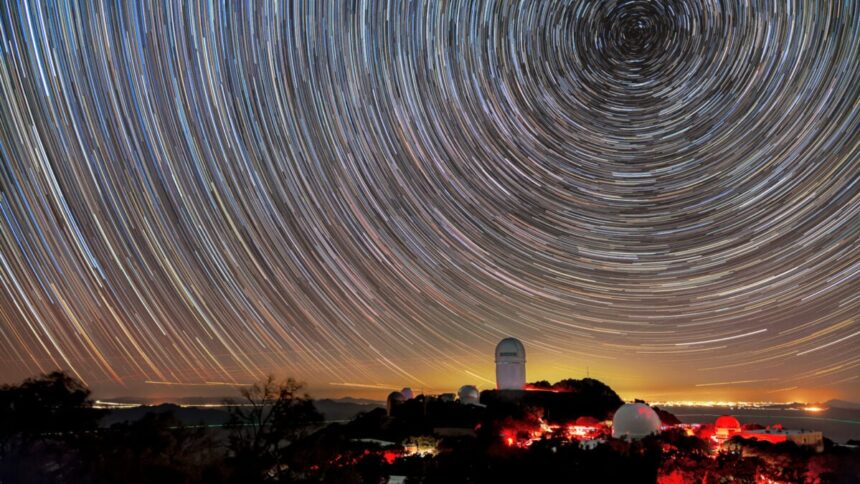Dark energy—the hypothetical force accelerating our universe’s expansion—sometimes raises more questions than it answers. A new study, however, presents surprising evidence that black holes may be an incubator for dark energy—suggesting that the force may be less constant than we believed.
In a paper published August 21 in Physical Review Letters, researchers used data from the Dark Energy Spectroscopic Instrument (DESI) to test a hypothesis that argues black holes convert dead star matter into dark energy. This theory, called the cosmologically coupled black hole (CCBH) hypothesis, implies that dark energy didn’t spontaneously emerge. Rather, dark energy is an organic byproduct of the cosmic circle of life, accumulating over time as stars formed and died following the Big Bang.
A theory that serves the data
This theoretical framework also conveniently links the rates of dark energy production and matter consumption to the rate of star formation, which the Hubble Space Telescope and the James Webb Space Telescope have confirmed multiple times. It also resolves a previous dissonance between DESI data and Earth-bound neutrino experiments, as the former didn’t seem to allow for the presence of neutrinos in the universe’s budget mass.
“This paper is fitting the data to a particular physical model for the first time, and it works well,” said paper co-author and DESI scientist Gregory Tarlé, in a statement from the University of Michigan. “It’s intriguing at the very least. I’d say ‘compelling’ would be a more accurate word, but we really try to reserve that in our field.”
Resolving cosmic tension
DESI—lodged in a corner of Arizona—maps the thousands of galaxies in our universe using 5,000 robotic eyes that can capture a different galaxy every 15 minutes. Since launching in 2018, DESI has been wildly successful in creating an unprecedentedly detailed map of our universe.
This 3D map has enabled physicists to arrive at groundbreaking conclusions about the nature of dark energy. At the same time, DESI data suggested that less matter exists today than in the past, creating some tension between cosmology and particle physics over the “correct” interpretation of the early universe.
The CCBH model offers an easy fix. “You find that the neutrino mass probability distribution points to not only a positive number but a number that’s entirely in line with ground-based experiments,” explained Rogier Windhorst, study co-author and an astrophysicist at Arizona State University. “I find this very exciting.”
The model “quantifiably links phenomena you would not initially expect to be related,” added Duncan Farrah, study co-author and an astrophysicist at the University of Hawaii. However, the idea, while promising, will require further scrutiny from both the community and future DESI findings, he said.
Indeed, with so many new instruments and perspectives, we’ve entered a golden era for cosmology. Of course, that should also bring a fair amount of chaos—but if the Big Bang could get its act together to create the universe, there’s reason to believe we can pull ourselves together, too.
Read the full article here












